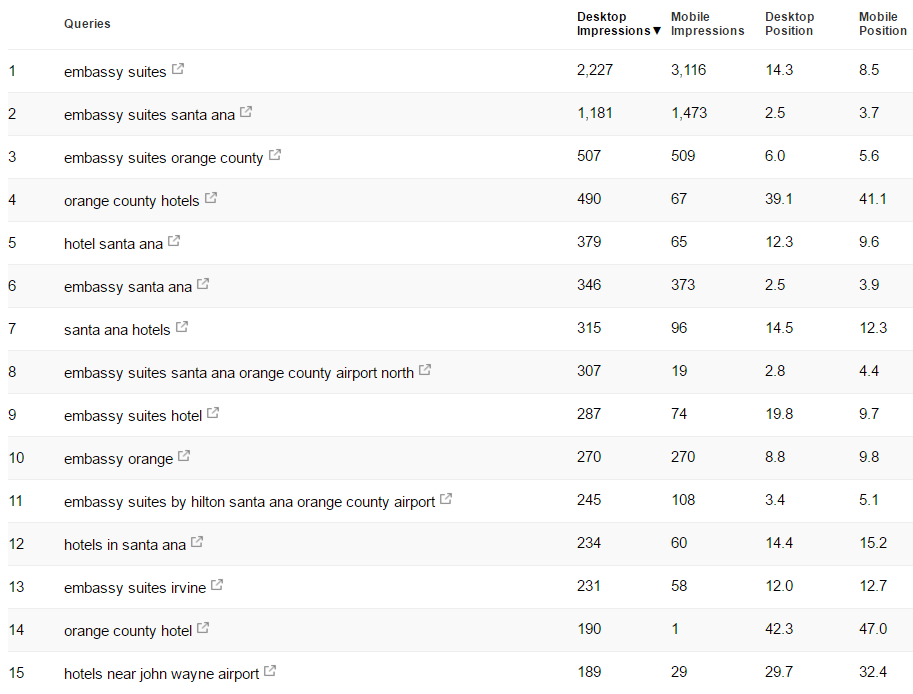In 2015, Google announced a milestone in internet behavior – more than 50% of searches in the United States were performed on mobile devices. To the seasoned digital marketing professionals at Blue Magnet Interactive, the announcement did not come as a surprise. Data from hotel websites shows that mobile visits surpassed desktop visits in 2016. Blue Magnet Interactive has built and managed hundreds of hospitality industry websites, giving the agency the unique opportunity to collect and analyze industry data. Blue Magnet Interactive analyzed a sample set of hotel websites, and the research clearly demonstrates that websites draw different demographics based upon the device type and that mobile users behave much differently than desktop users on hotel websites. By understanding these proven differences, you can develop strategies to drive conversion on these smaller screen resolutions.
Demographics of Mobile Users
Blue Magnet’s analytics show a significant difference in age and location data among mobile users compared to their counterparts with larger screens. Analyzing all 2016 data from a sample of 10 randomly selected hotel websites allows for a representative view of traffic demographics. Based on our sample, we saw mobile visitors were:
- 33% more likely to be visiting the website from the same state in which the hotel is located. More than 60% of mobile visitors were located in the same state as the hotel when visiting the website.
- 24% more likely to be a millennial (ages 18-34) compared to desktop users. Nearly 50% of identifiable users who visited on a smartphone were millennials.
This demographic data that skews younger and physically closer to the hotels differs from the typical makeup of a desktop device visitor. Be mindful of these differences. Tailoring special promotions and site copy to these users can drive bookings and increase conversion rates. While the most nearby users might not always be the audience to which you want to sell rooms (staycationers and last-minute travelers aside), there is still value in being able to quickly connect with guests that have already booked. Providing great directions, curated travel itineraries, and making hotel information readily available can dramatically increase the guest experience for your mobile-minded travelers.
Differences in Mobile Search Results
Barring paid referrals, the majority of traffic to hotel websites comes from Google organic searches. In a sample of 10 Blue Magnet Interactive managed hotel websites, an average of 62% of mobile traffic and 75% of desktop traffic can be tracked as coming from an organic search. Google has acknowledged a different mobile search index that presents different results for different device types. As seen in the screenshots below, taken from Google Search Console, an identical search query often provides users on different devices different results.

In this announcement, Google confirmed that mobile usability would be considered a key ranking factor in the mobile index. With the majority of searches now seeing this mobile index, it is more important than ever to have a mobile optimized site.
Mobile User Behavior
In addition to seeing different search results, mobile device users access and interact with sites differently.
- Mobile users are 8% less likely to land on the homepage; more frequently, they enter the site via other core pages or niche landing pages.
- On average, mobile users spend 25% less time on hotel websites than their desktop-using counterparts.
- Page load times are 41% higher on mobile devices. This page load time can affect behavior, influencing people to visit less pages and spend less time on the site.
Despite having comparable bounce rates, time spent on a site is generally lower for mobile device users. Knowing what information your mobile guests are looking for and serving it to them quickly will help increase conversions. Monitoring behavior flow, particularly on pages other than the homepage, will help determine which content is working and which is not. Additionally, the tendency of mobile cellular networks to load more slowly than WiFi or ethernet should guide your decisions about serving heavy bandwidth site components to mobile users. When in doubt, leave out unnecessary content that will take a long time to load.
Strategies to Increase Mobile Conversions
In summary, sites rank differently in Google searches, attract different demographics, and see different behavior metrics for different device types.
- With quicker interactions with sites, mobile users are more susceptible to highly-focused marketing channels and large site components, than desktop users. Large, easy-to-click buttons near the top of pages are easier for mobile users to find and interact with.
- Be sure to keep page load time in mind when deciding if content is suitable for mobile users.
- Keep a watchful eye on mobile landing pages and behavior flow and use this data to connect them with relevant information as quickly and efficiently as possible.
- Tailor specific promotions and site copy to the younger and more local demographic of mobile users. In-state resident rates and experiential offers placed near the top of landing pages frequented by mobile device users can lead to greater conversion rates.
Interested in learning more about mobile behavior? Curious about how you can build and manage a responsive website that harnesses the power of data to reach determined goals and drive up device-oriented conversions? Blue Magnet Interactive is the hospitality digital marketing expert and can take your digital marketing campaign to the next level! Drop us a line to get in touch!




